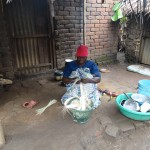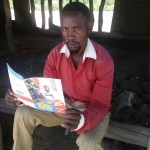Speeches Shim
Being able to reach a health facility can spell the difference between life and death for millions of rural Tanzanians. Harsh terrain, lack of transportation, and punishing distances often stand in the way. Thanks to the power of mobile technology, however, things are starting to change. Read how one expectant mother was able to get to her district hospital for urgent care thanks to dedicated local health workers, a phone call, and a little innovation.

Raised in Tanzania’s Kilombero district, Goa had only one source of income—the 25 cents she received weekly from family and friends. That changed in 2014, when Goa joined a savings and internal lending community, or SILC group. The group is supported by USAID under the U.S. Government’s Feed the Future initiative.
One morning in 2015, a mother brought her 9-month-old daughter to the Vumilia Dispensary, a health clinic in Tanzania’s Tabora region. Tecra Chubwa, the nurse who oversees the facility, remembers the infant and her mother, and even remembers weighing the girl herself. But when she later reviewed the day’s vaccination records, she discovered the child had not received the measles-rubella vaccine she was due for that day.

As a traditional healer in Ikombaboba village in Tanzania’s Tabora region, Albert Cosmas uses rituals and herbal remedies, learned from his grandfather, to heal people. He doesn't perform male circumcisions—it's not a norm for his community. When he learned that voluntary medical male circumcision (VMMC) services for HIV prevention would soon be available, he never envisioned becoming a VMMC “ambassador.”


Comment
Make a general inquiry or suggest an improvement.